Daily Vocabulary Words: Enhance Your Lexicon with Leading Newspapers & Publications
Welcome to the Daily Vocabulary section at Wordpandit!
Our mission is straightforward: to bring you essential vocabulary words featured in top newspapers and publications worldwide. By focusing on words you’ll encounter in renowned sources, we aim to help you enhance your vocabulary effectively and practically.
Our selection includes words from:
– The New York Times
– The Washington Post
– Scientific American
– BBC
– The Guardian
– Psychology Today
– Wall Street Journal
– The Economist
– The Hindu
– The Times of India
– The Economic Times
– Hindustan Times
– Live Mint
– The Indian Express
– And many more.
We are committed to your vocabulary development. Simply visit this section regularly and explore the daily posts. This is your go-to repository for commonly used words, providing significant practical benefits by familiarizing you with vocabulary from the leading publications listed above.
Make it a habit to visit our website daily and expand your lexicon with words from top newspapers and publications.
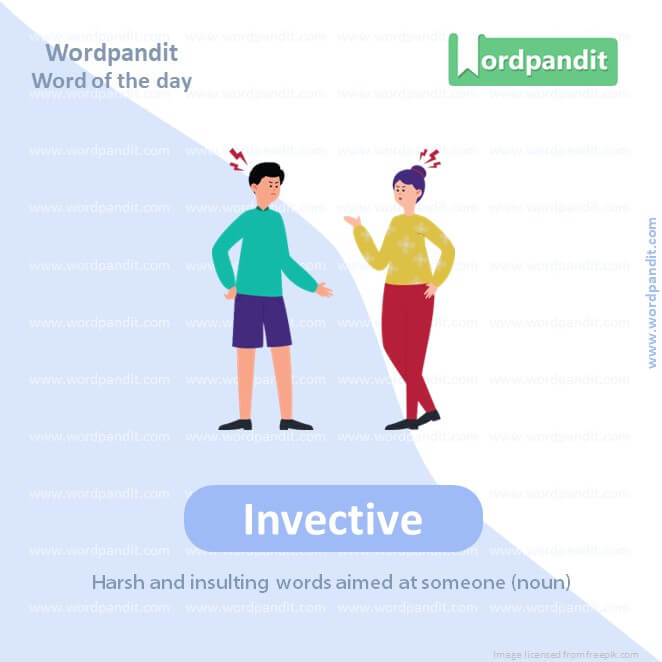
WORD 1: Invective
CONTEXT: ‘The Storm-Cloud of the Nineteenth Century’ was his invective against a particular ‘wind of darkness’ and ‘plague-cloud’ that, in his estimate, had begun to envelop Victorian cities only in recent years.
SOURCE: Aeon
EXPLANATORY PARAGRAPH: Imagine if someone says really mean words that hurt your feelings, like calling you silly or stupid in a very angry way. Those mean words are called “invective.” It’s when people use harsh or unkind words because they are really upset.
MEANING: Harsh and insulting words aimed at someone (noun).
PRONUNCIATION: in-VEK-tiv
SYNONYMS: Insult, abuse, criticism, slander, vilification
USAGE EXAMPLES:
1. The coach’s invective was hard to hear, but it motivated the players to do better.
2. She was shocked by the invective in the argument between the two friends.
3. Online comments can sometimes turn into invective when people get too angry.
4. His speech was filled with invective against his political opponents.
WORD 2: Ramblings
CONTEXT: By the end of his life at the turn of the century, he was widely considered insane. His ramblings on meteorology and the human spirit aren’t exactly treated with the same gravitas as his books on J M W Turner.
SOURCE: Aeon
EXPLANATORY PARAGRAPH: Imagine if someone is talking and talking, but it doesn’t really make sense, and they keep jumping from one thing to another without finishing their thoughts. Those kinds of talks or writings are called “ramblings.”
MEANING: Long, confusing, and often meaningless speech or writing (noun).
PRONUNCIATION: RAM-blingz
SYNONYMS: Babble, chatter, prattle, meandering, digressions
USAGE EXAMPLES:
1. Grandpa’s ramblings during his story made it hard to understand the main point.
2. The letter was full of her ramblings about the weather and other random topics.
3. His late-night ramblings on the phone were hard to follow.
4. She found his ramblings about the past quite amusing.
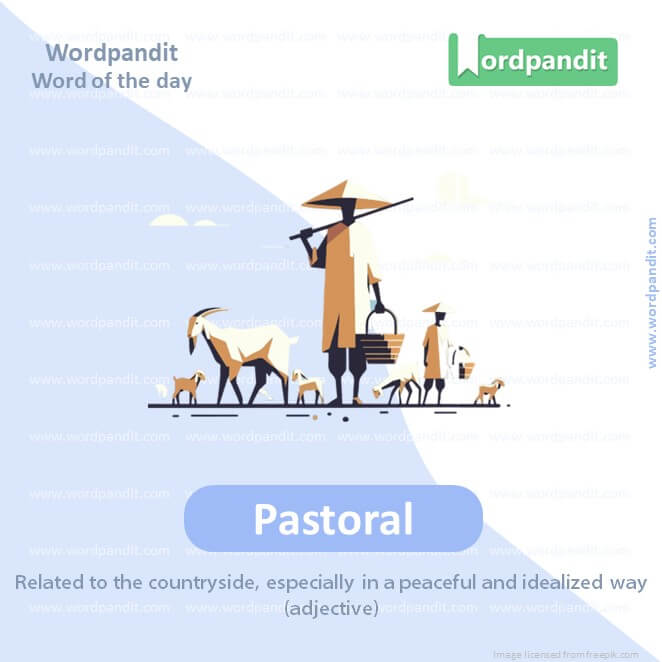
WORD 3: Pastoral
CONTEXT: Ruskin’s era had seen relentless transformation of pastoral landscapes into industrial hubs.
SOURCE: Aeon
EXPLANATORY PARAGRAPH: Imagine a peaceful place with green fields, trees, and maybe some cows or sheep grazing. It feels calm, quiet, and beautiful, just like in a storybook. That’s what “pastoral” means—something related to the countryside and its peacefulness.
MEANING: Related to the countryside, especially in a peaceful and idealized way (adjective).
PRONUNCIATION: PAS-tuh-ruhl
SYNONYMS: Rural, rustic, bucolic, country, agrarian
USAGE EXAMPLES:
1. The artist painted a beautiful pastoral scene with rolling hills and a blue sky.
2. They enjoyed their weekend retreat in a pastoral village far from the city.
3. The poem described a pastoral life, full of simple joys and nature.
4. She dreamed of living a pastoral life, surrounded by nature and animals.
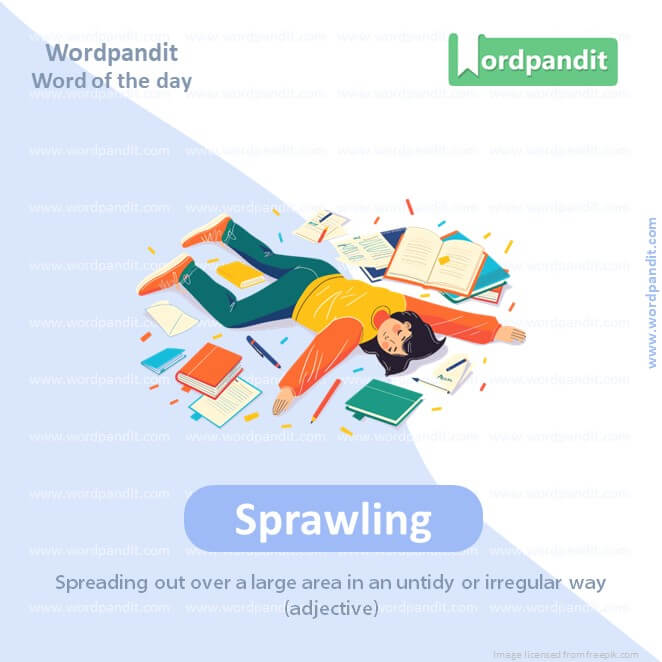
WORD 4: Sprawling
CONTEXT: Ruskin believed that the relentless pace of industrialisation, with its cacophony of tools and sprawling factories and environmental destruction, undermined psychological wellbeing: that the mind, much like the body, required a healthy social and physical environment to thrive.
SOURCE: Aeon
EXPLANATORY PARAGRAPH: Imagine a big, comfy blanket spread out all over the floor, covering a large area. When something is spread out widely and takes up a lot of space, we say it’s “sprawling.”
MEANING: Spreading out over a large area in an untidy or irregular way (adjective).
PRONUNCIATION: SPRAW-ling
SYNONYMS: Spreading, extending, stretching, expansive, rambling
USAGE EXAMPLES:
1. The sprawling city seemed to go on forever, with buildings and houses everywhere.
2. They lived in a sprawling house with lots of rooms and a big garden.
3. The sprawling park offered plenty of space for kids to play and explore.
4. His toys were sprawling all over the living room floor.
WORD 5: Indomitable
CONTEXT: She introduced herself to the American public as the child of an indomitable Indian immigrant mother.
SOURCE: The Guardian
EXPLANATORY PARAGRAPH: Imagine a superhero who never gives up, no matter how tough things get. They are so strong and brave that nothing can stop them. That’s what “indomitable” means—being so strong and determined that nothing can beat you.
MEANING: Impossible to defeat or discourage (adjective).
PRONUNCIATION: in-DOM-uh-tuh-buhl
SYNONYMS: Unbeatable, invincible, unstoppable, resilient, unyielding
USAGE EXAMPLES:
1. Her indomitable spirit helped her win the race, even when she was tired.
2. The indomitable courage of the firefighters saved many lives.
3. He faced every challenge with an indomitable attitude.
4. The team’s indomitable will led them to victory against all odds.
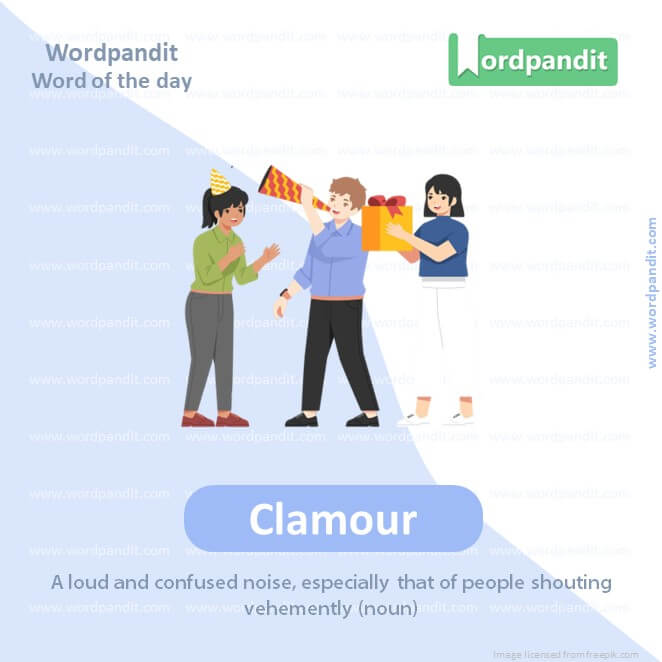
WORD-6: Clamour
CONTEXT: On Tuesday, the West Bengal Assembly unanimously passed The Aparajita Women and Child (West Bengal Criminal Laws Amendment) Bill, 2024, by a voice vote, following the rape and murder of a doctor at a government hospital in Kolkata on August 9 and a persistent clamour for justice.
SOURCE: The Hindu
EXPLANATORY PARAGRAPH: Imagine if you and all your friends started shouting at the same time because everyone wanted to be the first to play with a new toy. That loud noise everyone is making is called “clamour.” It’s when a lot of people are talking loudly or shouting all at once because they really want something or want to be heard.
MEANING: A loud and confused noise, especially that of people shouting vehemently (noun).
PRONUNCIATION: KLAM-er
SYNONYMS: uproar, din, racket, babel, commotion
USAGE EXAMPLE:
1. The children’s clamour in the playground could be heard from far away.
2. There was a great clamour from the fans when the concert was canceled.
3. The clamour in the cafeteria grew as lunch time approached.
4. The protesters raised a clamour outside the city hall.
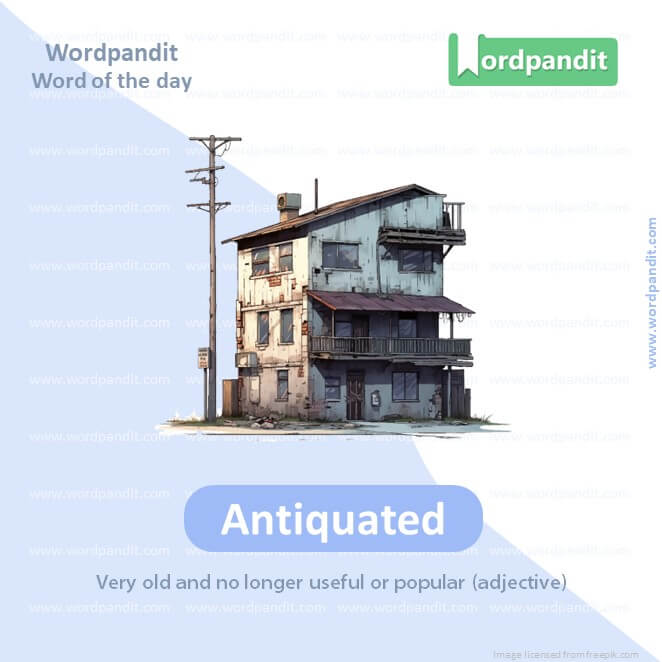
WORD 7: Antiquated
CONTEXT: Yes, she can; but that doesn’t mean she will. She may be marginally ahead in nationwide polling, but with the antiquated electoral system that the US uses for its presidential election, she could win the popular vote, as Hillary Clinton did in 2016, and still lose because of a few tens of thousands of swing voters in battleground states in the Midwest and the sun belt.
SOURCE: The Guardian
EXPLANATORY PARAGRAPH: Imagine finding an old toy in the attic that your grandparents used to play with. It’s old, and people don’t use it much anymore. When something is very old and not used as much today, we call it “antiquated.”
MEANING: Very old and no longer useful or popular (adjective).
PRONUNCIATION: AN-ti-kway-tid
SYNONYMS: Outdated, old-fashioned, obsolete, archaic, ancient
USAGE EXAMPLES:
1. The antiquated computer couldn’t run the latest software.
2. She decided to replace the antiquated furniture with something more modern.
3. His ideas about education were considered antiquated by many.
4. The factory used antiquated machines that needed to be updated.
WORD 8: Incongruity
CONTEXT: Ultimately, what is most peculiar about this world election is the sheer incongruity of cause and potential effect.
SOURCE: The Guardian
EXPLANATORY PARAGRAPH: Imagine seeing a clown at a very serious meeting, where everyone is talking about important things. The clown doesn’t really fit there, right? That’s called “incongruity”—when something doesn’t fit or seem right in a certain situation.
MEANING: Something that is out of place or not in harmony with its surroundings (noun).
PRONUNCIATION: in-kong-GROO-i-tee
SYNONYMS: Mismatch, inconsistency, oddity, disparity, contradiction
USAGE EXAMPLES:
1. The incongruity of the fancy dress at the picnic made everyone laugh.
2. The incongruity between his calm voice and his angry words was confusing.
3. She noticed the incongruity of a modern car in the middle of the old village.
4. The movie was full of incongruities that made the story hard to follow.
WORD 9: Divisiveness
CONTEXT: There’s an empirical test for divisiveness. If something appeases one section of the community and enrages another, it would seem to fit the bill.
SOURCE: The Guardian
EXPLANATORY PARAGRAPH: Imagine two friends arguing and then deciding not to play together anymore. This situation causes a split between them. “Divisiveness” is when something causes people to argue or separate into different groups.
MEANING: The quality of causing disagreement or hostility between people (noun).
PRONUNCIATION: dih-VY-siv-ness
SYNONYMS: Discord, conflict, disagreement, disunity, rift
USAGE EXAMPLES:
1. The topic of the new rule caused divisiveness among the students.
2. The leader’s speech was criticized for its divisiveness.
3. Divisiveness in the group made it hard to reach a decision.
4. The divisiveness of the issue led to a heated debate.
WORD 10: Bigoted
CONTEXT: Having raised hopes and expectations in the LGBTQ+ community that new questions in the 2026 census meant they would finally, literally, be counted, it backtracked out of fear – fear of exposing transgender people in particular to a bigoted debate and of heralding another round of culture wars that would drown out its economic message.
SOURCE: The Guardian
EXPLANATORY PARAGRAPH: Imagine someone who only likes people who are exactly like them and is mean to others who are different. That person is called “bigoted.” It’s when someone is unfairly against others because of their different opinions, race, or beliefs.
MEANING: Showing strong, unfair dislike for people who are different in some way, like in their race, religion, or opinions (adjective).
PRONUNCIATION: BIG-uh-tid
SYNONYMS: Prejudiced, biased, intolerant, narrow-minded, discriminatory
USAGE EXAMPLES:
1. The bigoted remarks made everyone in the room uncomfortable.
2. He was known for his bigoted views and often refused to listen to others.
3. It’s important to stand up against bigoted behavior in any form.
4. The school took a strong stance against any bigoted actions among students.













